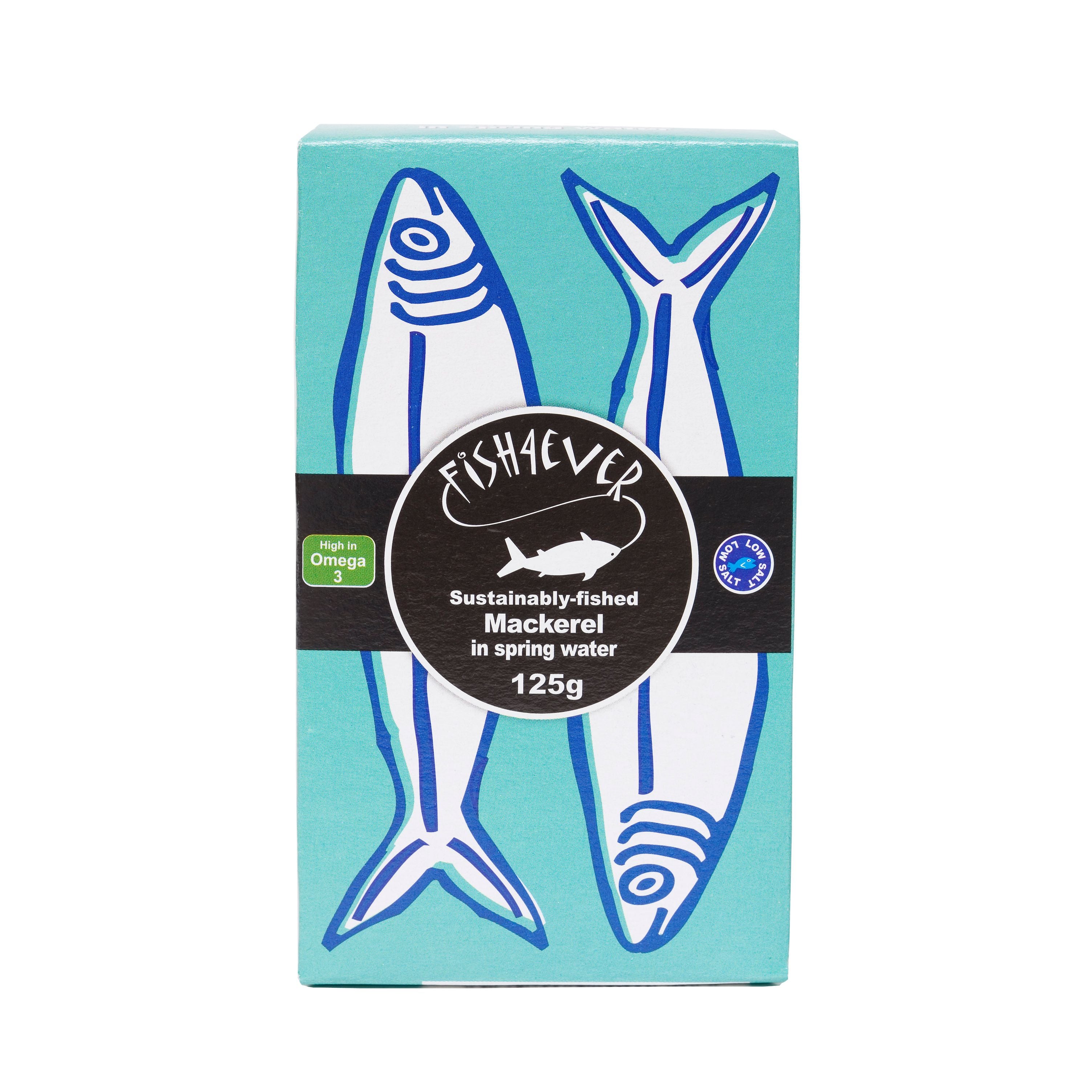
Scottish fished and packed mackerel is a British seafood classic. This is caught at the optimum time when the Omega 3 is at its best.
Packed in the North of Scotland in local Scottish spring water.
Ingredients: Mackerel, Spring water
Allergen Information: Contains Fish
Every effort has been taken to remove the bones from this product, but some may remain.
Typical Values per 100g (drained)
Energy 924kJ/ 222kcal
Fat - Total 16.6g
of which saturates 3.2g
Carbohydrates 0g
of which sugars 0g
Protein 18.2g
Salt 0.1g
Sodium 40mg
Omega 3 3.2g
Serving size: 42g (Drained weight)
Details Click to see more
Fish4Now
Fish4Ever believe in delivering not only the highest quality and most sustainably sourced fish, but also fantastically creative homemade style recipes using the finest organic ingredients.
Fish4Health
Oily fish such as tuna, mackerel, sardines, salmon and anchovies are high in long-chain omega-3 fatty acids and a great source of vitamin D.
Fish4Quality
Thanks to their Unique Quality Charter you can be certain that Fish4Ever products are fished locally, landed fresh, and prepared to the highest quality standards. Working from the whole fish, they add only the finest organic ingredients such as first cold pressed extra virgin oil, local volcanic spring waterand distinctive flavoursome sauces.
Fish4Ever
Fish4Ever was founded on the idea of bringing Organic values to sustainability in fish. Their holistic, all-encompassing approach, is both real and comprehensive, focusing on land, sea and people, supporting not only the best possible fishing practices, but also the communities and small boats that enact them.
From the Land
Fish4Ever is the only canned fish brand in the UK which insists on organic land ingredients. Organic farming standards address the issues of intensive farming and the use of harmful chemicals, that not only damage the land but through river systems can result in the pollution of coastal waters.
From the Sea
Fish4Ever choose small boats first, local fishing and good methods. Sustainable choices allow fishing that doesnt create damage to sea life. All their fish are caught with very selective equipment in precise parts of the sea.
For the People
Fish4Ever support local boats fishing carefully, not far from their port of origin, paying and treating their workers well. They prefer small-scale artisan boats and local packing whenever possible and believe in fair pay and workers rights.
The Details:
1. Fish4Ever will always buy the best.
Canned fish is a global industry with intense price competition. It means there is a huge pressure to find the cheapest possible fish and the cheapest possible production. They will always buy quality first, looking for small producers with a strong history and expertise, based in long established fishing communities. They shop for the story not the price. Fish4Ever visit all our suppliers in person.
By buying on quality before price they do not constantly go to the cheapest possible producer, playing one off against the other, but search for producers who have strong quality and sourcing ethics.
Fish4Ever aim to establish long term supply relationships to help provide stability to their producers. By valuing quality, the message thry send is simple but powerful do things well and dont cut any corners. For example there are many canned sardines which still have scales in them or have not been well gutted. This will be to speed the process up and gain yield but at the cost of quality and care. Sardines and mackerel can be fished at the wrong time when they have just eaten and their stomach is full so it is distended and will tear. Fish4Ever buy from the skippers that know when to fish. They select by size and buy in the season when the fat levels are higher and the fish more succulent.
In tuna it is possible to scrape lesser parts of the fish off the bone and add that back into chunks, it is possible to dye the red parts of the meat and water can be injected into the chunks to expand the weight. All of these savings are routinely used in the highly competitive tuna industry. If your message as a buyer is give me the cheapest price possible, even if you separately have a quality control system, you are incentivising your suppliers to do things as cheaply as possible.


